
Augusta, officially Augusta–Richmond County, is a consolidated city-county on the central eastern border of the U.S. state of Georgia. The city lies across the Savannah River from South Carolina at the head of its navigable portion. Georgia's third-largest city after Atlanta and Columbus, Augusta is located in the Fall Line section of the state.

Sherman's March to the Sea was a military campaign of the American Civil War conducted through Georgia from November 15 until December 21, 1864, by William Tecumseh Sherman, major general of the Union Army. The campaign began with Sherman's troops leaving the captured city of Atlanta on November 15 and ended with the capture of the port of Savannah on December 21. His forces followed a "scorched earth" policy, destroying military targets as well as industry, infrastructure, and civilian property, disrupting the Confederacy's economy and transportation networks. The operation broke the back of the Confederacy and helped lead to its eventual surrender. Sherman's decision to operate deep within enemy territory and without supply lines is considered to be one of the major campaigns of the war, and is taught by some historians as an early example of modern warfare or total war.
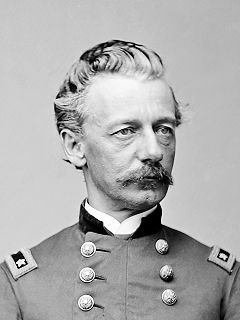
Henry Warner Slocum, Sr., was a Union general during the American Civil War and later served in the United States House of Representatives from New York. During the war, he was one of the youngest major generals in the Army and fought numerous major battles in the Eastern Theater and in Georgia and the Carolinas. While commanding a regiment, a brigade, a division, and a corps in the Army of the Potomac, he saw action at First Bull Run, the Peninsula Campaign, Harpers Ferry, South Mountain, Antietam, and Chancellorsville.

The United States Army's Officer Candidate School (OCS) is an officer candidate school located at Fort Benning, Georgia, that trains, assesses, and evaluates potential commissioned officers of the U.S. Army, U.S. Army Reserve, and Army National Guard. Officer candidates are former enlisted members, warrant officers, inter-service transfers, or civilian college graduates who enlist for the "OCS Option" after they complete Basic Combat Training (BCT). The latter are often referred to as college ops.
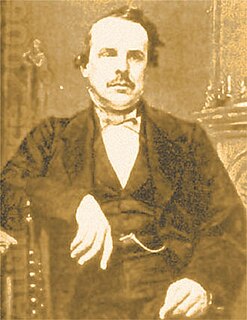
Francis S. Bartow was a licensed attorney turned politician, serving two terms in the United States House of Representatives and becoming a political leader of the Confederate States of America. Bartow was also a colonel in the Georgia Militia commanding the 21st Oglethorpe Light Infantry during the early months of the American Civil War. Bartow was a delegate from Georgia's 1st congressional district to the Southern Convention in Montgomery, Alabama becoming an inaugurating member of the Confederate Provisional Congress—leading efforts to prepare defensive forces for an impending federal invasion which did occur, protracting into The American Civil War of 1861–65.

Samuel Elbert was an American merchant, soldier, and politician from Savannah, Georgia.
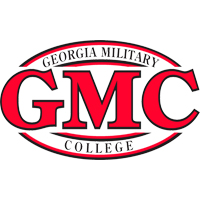
Georgia Military College (GMC) is a public military junior college in Milledgeville, Georgia. It is divided into the junior college, a military junior college program, high school, middle school, and elementary school. It was originally known as Middle Georgia Military and Agricultural College, until 1900. Although it is a state-funded institution, GMC is not affiliated with either the University System of Georgia or the Technical College System of Georgia.

Robert Michael Kimmitt was United States Deputy Secretary of the Treasury under President George W. Bush. He was nominated by President Bush on June 29, 2005. The United States Senate unanimously confirmed him on July 29, 2005, and he was sworn into office on August 16, 2005. Kimmitt served through the end of the Bush administration, leaving office on January 20, 2009.
Benedictine Military School is an American Roman Catholic military high school for boys located in Savannah, Georgia, United States. It was founded in 1902 by the Benedictine monks of Savannah Priory, which still operates the school, under the auspices of the Roman Catholic Diocese of Savannah.

Gilbert Moxley Sorrel was a staff officer and Brigadier General in the Provisional Army of the Confederate States.

Robert Houstoun Anderson was a West Point graduate, an infantry officer in the United States Army and later served as a Brigadier General in the Confederate States Army during the American Civil War, After the war he served as the Chief of the Police for the city of Savannah for 23 years and was twice appointed to serve on the Visitor's Board of the United States Military Academy at West Point, New York, NY. He played an important role with reunification efforts after the war.
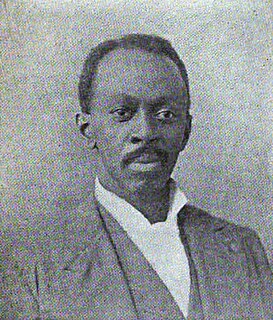
Richard Robert Wright Sr. was an American military officer, educator and college president, politician, civil rights advocate and banking entrepreneur. Among his many accomplishments, he founded a high school, a college, and a bank. He also founded the National Freedom Day Association in 1941.

William Henry Stiles was a United States Representative and lawyer from Georgia. He was the grandson of Joseph Clay.
Alfred Ely Beach High School is one of the oldest public high schools in Savannah, Georgia, United States.
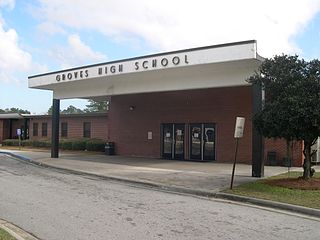
Robert W. Groves High School is a public secondary school located in Garden City, Georgia, United States, serving students in grades 9–12. The school is part of Savannah-Chatham County Public Schools, with admission based primarily on the locations of students' homes.

Frank O'Driscoll Hunter was a World War I flying ace, being credited by the United States Army Air Service with downing nine enemy aircraft. Hunter became an advocate of fighter aircraft strategy and tactics. In World War II he served as commanding general of the VIII Fighter Command and, later, the First Air Force.

Daniel William Christman is a retired United States Army lieutenant general, former Superintendent of the United States Military Academy (1996–2001), and the current Senior Vice President for International Affairs, U.S. Chamber of Commerce. A 1965 graduate of West Point, he went on to earn multiple post-graduate degrees and hold numerous commands during his army career. Christman served in highly visible and strategically important positions and four times was awarded the Defense Distinguished Service Medal, the nation's highest peacetime service award.

The 362nd Signal Company is a military communications company of the United States Army subordinate to the 41st Signal Battalion, 1st Signal Brigade and located at Seoul Air Base in South Korea.
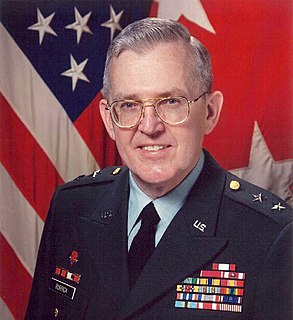
Donald Burdick is a retired United States Army major general who served as director of the Army National Guard.

The Junior Reserve Officers' Training Corps is a federal program sponsored by the United States Armed Forces in high schools and also in some middle schools across the United States and at US military bases across the world. The program was originally created as part of the National Defense Act of 1916 and later expanded under the 1964 ROTC Vitalization Act.



















